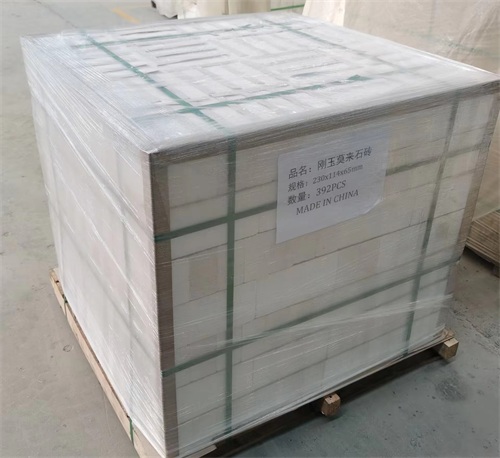Refractory bricks are a type of heat-resistant material that are designed to withstand high temperatures and harsh conditions. They are commonly used in industrial settings, such as furnaces, kilns, and boilers, where they play a critical role in maximizing performance and durability.
In this article, we will explore the key benefits of using refractory bricks and discuss some best practices for maximizing their performance and durability.
Benefits of Refractory Bricks
1. High Temperature Resistance
One of the primary benefits of refractory bricks is their ability to withstand high temperatures. They are designed to resist thermal shock, which occurs when a material is exposed to rapid temperature changes. Refractory bricks can withstand temperatures ranging from 1,000°C to over 1,800°C, depending on the type of brick and its composition.
2. Chemical Resistance
In addition to high temperature resistance, refractory bricks are also highly resistant to chemical corrosion. They are able to withstand exposure to a wide range of chemicals, including acids, bases, and molten metals.
3. Low Thermal Conductivity
Refractory bricks have a low thermal conductivity, which means that they are able to retain heat and prevent it from escaping. This property is essential in industrial applications, where it is important to maintain a consistent temperature in order to achieve optimal performance.
4. High Strength and Durability
Refractory bricks are extremely strong and durable, which makes them ideal for use in harsh industrial environments. They are able to withstand the stresses of high temperatures, thermal shock, and mechanical impact, which helps to prolong their lifespan and reduce maintenance costs.

Best Practices for Maximizing Performance and Durability
1. Choose the Right Type of Refractory Brick
There are many different types of refractory bricks available, each with its own unique properties and composition. It is important to choose the right type of brick for your specific application in order to maximize performance and durability.
For example, if you are working with molten metals, you will need a brick that is highly resistant to corrosion and can withstand exposure to high temperatures. On the other hand, if you are working with acidic or basic materials, you will need a brick that is resistant to chemical corrosion.
2. Install Bricks Correctly
Proper installation is critical to the performance and durability of refractory bricks. It is important to follow the manufacturer's instructions carefully and to use the correct mortar and bonding materials.
Bricks should be installed tightly and securely, with no gaps or spaces between them. Any gaps or spaces can lead to thermal stress and reduce the lifespan of the bricks.
3. Monitor and Maintain the Bricks
Regular monitoring and maintenance are essential to maximizing the performance and durability of refractory bricks. It is important to inspect the bricks regularly for signs of wear or damage, such as cracks or erosion.
Any damaged bricks should be replaced as soon as possible in order to prevent further damage to the surrounding bricks. It is also important to clean the bricks regularly to remove any debris or contaminants that could impact their performance.
4. Avoid Thermal Shock
Thermal shock occurs when a material is exposed to rapid temperature changes, which can cause it to crack or break. Refractory bricks are designed to resist thermal shock, but it is still important to avoid rapid temperature changes whenever possible.
For example, if you are working with a furnace or kiln, it is important to allow it to cool down slowly rather than shutting it off abruptly. This will help to prevent thermal shock and prolong the lifespan of the bricks.
5. Use Proper Insulation
Proper insulation is essential to maximizing the performance and durability of refractory bricks. Insulation helps to retain heat and prevent thermal shock, which can help to prolong the lifespan of the bricks.
It is important to choose the right type of insulation for yourspecific application, based on factors such as temperature range, chemical resistance, and thermal conductivity. Insulation materials should be installed properly and securely, with no gaps or spaces that could allow heat to escape.
6. Schedule Regular Maintenance and Replacement
Even with proper installation and monitoring, refractory bricks will eventually wear out and need to be replaced. It is important to schedule regular maintenance and replacement based on the expected lifespan of the bricks and the specific conditions of your application.
Regular maintenance and replacement can help to prevent downtime and reduce the risk of equipment failure. It can also help to maximize the performance and efficiency of your industrial processes.
Conclusion
Refractory bricks are a critical component of many industrial processes, providing high temperature and chemical resistance, low thermal conductivity, and high strength and durability. By following best practices for installation, maintenance, and replacement, it is possible to maximize the performance and durability of refractory bricks and reduce the risk of equipment failure and downtime.
When choosing refractory bricks for your specific application, it is important to consider factors such as temperature range, chemical resistance, and thermal conductivity in order to select the right type of brick for your needs. With proper installation, monitoring, and maintenance, refractory bricks can provide long-lasting and reliable performance in even the harshest industrial environments.
Contact: Mgr. Han
Phone: 0086-13589497465
Email: 1255953279@qq.com
Add: Industrial Area of Lingzi Town,Zichuan District,Zibo City, Shandong,China